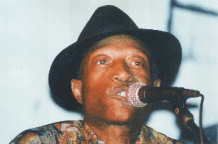
Wilbur Cole
Featured Musician — Wilbur Kenneth Cole
Born August 14, 1937, in Silver Creek, Mississippi.
Songwriter, Vocalist, Keyboard Player, Entertainer — Blues, R&B, Soul and Spiritual
Interview by Steve Vonderhaar & Judy Cedar, 2006.
Plays on Releases:
- Soulmates: Where Do We Go From Here?, 2006, Fillet O' Soul Records
- Soulmates: Big Trouble, 1998, Fillet O' Soul Records
- Soulmates: Mississippi Soupbone, 1996, Fillet O' Soul Records
- Band of Thieves: Band of Thieves, 1975, Sound 80 Studios
Also Appears on:
- Boom Boom Steve V.: From the Shadows, 2002, Cold Wind Records
- Deborah Joyce: Swan Song, 2004, Fillet O' Soul Records
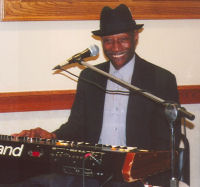
Mr. Cole at the keyboard.
Examples of Song Originals:
- “Talkin' About”
- “Tell Somebody”
- “Don't Cry”
- “Mississippi Soupbone”
- “Nothing You Can Do”
Mississippi Native Shines Bright in the Twin Cities
On August 14, 1937, Wilbur Kenneth Cole became the second son of Pashie and Sim Earcell Cole of Silver Creek, Mississippi. Wilbur had two siblings: Alexander Leon (oldest) and Shirley Elizabeth (youngest).
Except for a brief stint with trumpet in the school band at Prentiss, Mississippi, Wilbur received no formal musical instruction as a child growing up in the farmland surrounding Silver Creek, MI, where he was raised. This is not to say there weren't abundant musical influences which profoundly shaped today's popular Twin Cities rhythm and blues musician\performer. Wilbur's Aunt Rosie Bell Cole was a piano instructor and Wilbur's mom and dad kept a piano in their home. Wilbur's father studied music in college and taught math for 37 years.
And, as was the case with many black children in the 1940s rural Mississippi, the earliest musical influences were lifted from the Baptist church (Oakvale) where spiritual, “strictly spiritual” singing emanated. “Like a child receiving his first bicycle”, is how Wilbur describes the feeling of hearing his uncles by marriage, Willie and Forty McGee, sing spirituals. Wilbur recalls that it was one of the McGee brothers who introduced the original members of what was to become the Mississippi Blind Boys and later the famous Blind Boys.
Wilbur's first exposure to a live band was when his older brother, Alexander who plays harmonica, joined a distant cousin, Sep, on guitar and a drummer to play the blues. Wilbur, wanting to join in, became adept at the “hambone and jews harp” and would participate as allowed by Alex. The band mostly performed at school functions.
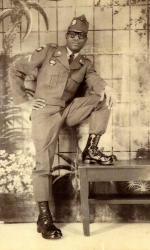
Wilbur in the Army.
In 1955 Wilbur joined the Army and began a family. Wilbur served as a paratrooper in the 82nd Airborne out of Fort Bragg, North Carolina where he made 34 jumps. [Several of Wilbur's children have also served in the military and his oldest made it a career.] After five years in the military, Wilbur moved to New Orleans and found work driving truck and working as an applicator. He joined a vocal group called the Silver Tones. The Silver Tones worked the clubs in and around New Orleans. While in New Orleans, Wilbur associated with Prince La La, who is the brother of “Papoose”, Fats Domino's bass player. Before Wilbur joined the Silver Tones, he helped them with a few gigs when the group's singer left to serve in the military. It was these first gigs that sold Wilbur on pursuing a musical career.
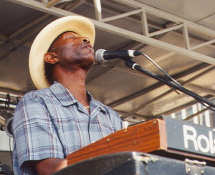
Out in the open.
In 1965 Wilbur moved to Minnesota. Wilbur and his wife, Verline (aka Puddin') reside in St. Paul. Soon after his arrival in the Twin Cities, a friend (Tex) sold Wilbur his first keyboard for $25. That same night, Wilbur ended up in a tough Minneapolis club called the Bucket of Blood to see Maynard Walker. Walker was the band's leader and guitar player. The band featured Willie Taylor on vocals and Jo Jo Williams on bass. Wilbur joined the band and began his musical career playing the Minneapolis/St. Paul area. Wilbur played with this band for approximately three years. [Eventually the club closed and the owner, Jimmy Fuller, built the Riverside Supper Club.]
In 1973 Wilbur enrolled (under the GI Bill) in a few music classes at the University of Minnesota to gain a better understanding of music and he studied music form, song writing and music history. But Wilbur goes on to say that his favorite definition of music is the one his father provided him, “a culmination of harmonious sounds that affect your auditory nerves.”
Throughout this period, Wilbur continued to learn blues and music in general. Wilbur became associated with Lazy Bill Lucas, Jo Jo Williams, Mojo Buford and Big Walter Smith who had all migrated to the Twin Cities to begin resurgent careers performing blues. Wilbur's musical knowledge increased greatly when he met versatile Twin Cities guitarist, Donald Breedlove. Together Wilbur and Breedlove formed a band to play the Whiskey a Go Go in St. Paul. Wilbur and Breedlove spent many hours rehearsing and studying music theory.
At about the same time blues had begun to lose its popular appeal Wilbur began playing in local bands that relied on the sounds of Motown. One of these groups, the Exciters, opened for the Temptations and the Spinners when they played in St. Paul and they also opened for Diana Ross while on tour in Chicago. In the early 1970s Wilbur joined the Band of Thieves, which produced a nationally distributed album featuring one of Wilbur's original tunes called “Do You Know What She Needs?” This band toured regionally. Wilbur was asked what was his favorite club outside our state and he answered: Surf Ballroom in Clearwater, Iowa.
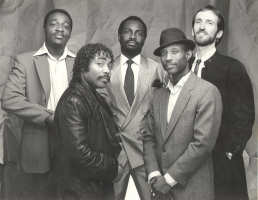
The Bound Band 1985.
After surviving the disco era in the mid 1970s Wilbur formed the Bound Band. The Bound Band featured soulful tenor, Willie Walker, and played predominately to African American audiences in the Twin Cities area. This band continues to this day.
While still affiliated with the Bound Band, Wilbur also began playing with the Soulmates featuring John “Bluesman” Johnson (brother of Lady Blue Johnson) in 1992. After Bluesman's departure in 1993 Wilbur became the primary voice of the Soulmates. With Wilbur at the helm, the Soulmates have become one of the Twin Cities hardest working and popular blues acts. The Soulmates have appeared at several regional blues festivals and fronted many national acts traveling through the Twin Cities, including Bo Diddley, Johnny Winter, Hootie & the Blowfish, Tab Benoit, Junior Wells and Roomful of Blues.
Wilbur was featured for his vocal and keyboard prowess at the annual blues extravaganza sponsored by Whiskey Junction. In September 1996 Wilbur was the subject of the monthly artist profile in the Twin Cities Blues News joining Captain Jack McDuff, Mojo Buford and Big Walter Smith among others for that distinction.
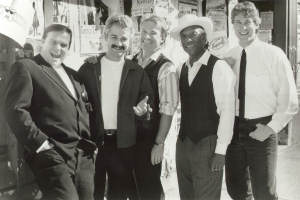
Wilbur with the Soulmates.
In 1996 the Soulmates released their inaugural CD titled, Mississippi Soupbone on Cold Wind Records. In addition to the title track, “Mississippi Soupbone”, Wilbur composed and/or is the featured vocalist on the recordings nine tracks. In 1998 the Soulmates released their follow up CD, Big Trouble. Big Trouble's ten tracks contain three Cole originals and he is a featured vocalist on four others. In 2006 the third Soulmates' CD (scheduled for release in April) is named Where Do We Go from Here? The song list for the newest CD includes six of Wilbur's original compositions. “Where Do We Go from Here?” is a John O'Keefe original and Wilbur says this song is especially touching and resonates completely with him ... it speaks to his own sad trials in life and his need to pray to work out problems and gives the message of what you can do to minimize regret.
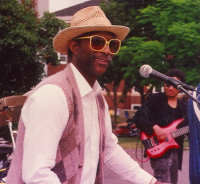
Grand Old Days, 1994
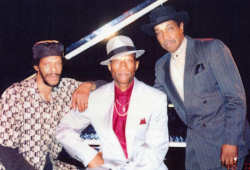
Gerald Leago, Wilbur & Dicky Lou
In 2001 Wilbur began hosting the Sunday matinee blues jam at Floyds in Victoria Minnesota that continues to this day. In addition to this jam, Wilbur also hosted a Wednesday night jam at Arnella's in St. Paul from 2000 to 2003.
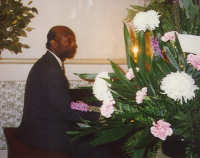
Playing for a funeral
at Mt Zion.
In 2003 Wilbur accepted a position as a musical minister at the Mt. Zion Church of God in Christ. Wilbur helps to select, arrange and perform spiritual music each Sunday and for special occasions. When Wilbur is not working on his music or volunteering at Mt. Zion, Wilbur enjoys family outings, fishing and the game of dominos. Wilbur enjoys listening to a variety of music including Blues, Spiritual, Jazz, R & B, Soul and Classical.
When asked what advice he would give to the next generation of blues musicians, Wilbur said he thought it most important to be able to understand the various genres and be able to define and describe music. Musicians should aspire to not just play the music but also communicate the music. There is no one “master” of music and it is up to each musician to learn to master the unique music from within. One thing Wilbur appreciates about the local blues scene is the fact that it has been a teacher for Wilbur because blues music carries all the basics. Wilbur saw the blues go into semi-dormancy and then come back and he says the blues might fade but it has a way of always finding its way back because it is built upon basics and feelings.
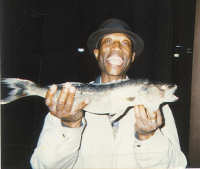
Gone Fishin', Good Eat'n Tonight.
And, he thinks mentoring/coaching the new musicians is important. Wilbur remembers how much he was influenced by Euless Gibson who opened the door that eventually led to acquaintances with New Orleans musicians such as Fats Domino, Arnie Kato, Lloyd Price and guitarist Billy Washington. On the flip side, Wilbur has taken time to help out musicians himself. One stands out in particular, named Pierre Louis (keyboard player in St. Paul – Louis Connections). Louis would come to Wilbur's home to play and learn music as a youth and Wilbur was able to arrange for him to play at the Selby Avenue Club.
Wilbur received the second annual McCaled Award at the Ford Parkway Hall a few years back in recognition as being one of Minnesota's finest blues keyboard players. When asked about his broad and diverse musical background, this 69 year old musician proclaimed “Yeah – and I'm still growing”. When Wilbur looks back over the years he is humbled by the fact that he has been able to produce lyrics, compose pieces of music and play from memory without reading sheet music. Wilbur thinks this is his gift from God and he is glad he used his gift throughout his life.
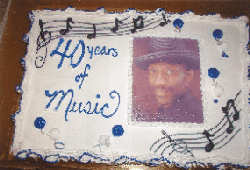
Note - The GTCBM Society creates Profile Books (with additional photos) for our events. We make those available for your viewing at various functions we hold each year.
Contact Us
page last updated:
Wednesday, December 2, 2020



